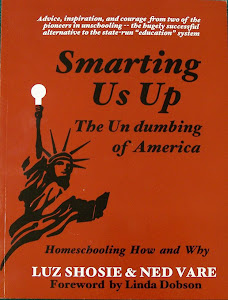“If the old saying is true, that what one generation learns in school is the philosophy of the next, then the philosophy of the next generation will be totalitarianism.” -- John Whitehead, Rutherford Institute (2006)
Let's assume that Mr. Whitehead is right, then let’s see what our kids’ generation is learning in school.
From children’s first days in school, they are told, “Sit down, shut up, be still -- if you don’t, you'll be punished; if you still don’t, you'll be drugged.” What do the children learn from that? That they are not trusted, that their desires, interests and needs are not important; that they must obey authority blindly; that they belong to the state.
Public school’s first goal is to separate children emotionally from their parents. Therefore, the training is for obedience to arbitrary rules and dependency on others, including institutions. The goal, we learn, is to turn “human resources” (our children) into soldiers, factory workers and clerks.
Goal #2 is teaching that the group is more important than the individual. The training is for consensus (group-thinking), not individual decision-making. Public schools operate on a socialist philosophy, taxing everyone to benefit the few, with no one paying directly for the services. Traditional values of right and wrong are discredited; ethics is considered flexible; religion is out; parents are deemed old-fashioned and are not respected by the school.
Next, we discover that the schools are not good places for learning. Children hear that reading is good, but they don’t learn how; they are taught to appreciate math, but are not given the tools of calculating. They learn that guessing is better than knowledge, and yet without knowing the basic skills of reading and math, children will always have difficulty learning. School, then, is for therapy, not for knowledge. Its employees believe they are not responsible for anyone’s learning. “Besides,” they say, “teaching basic skills is boring for us teachers.”
Most public schools have eliminated recess with the excuse that it reduces class time. They disregard all the research showing that free play is extremely important to a child’s physical, mental and social development. Without recess, the child has less opportunity to interact with peers, and comes to believe that his/her life must be programmed by others. The children learn not to trust themselves or each other and that they do not control their own lives.
Kids learn that if you’re gifted, public school does not offer you appropriate instruction, but if you’re slow or disinterested you get lots of attention and the system spends lavishly on you. Kids learn that if they’re bored or confused, no one will help them. They learn that their strengths are ignored while the schools look for their weaknesses. The philosophy behind this is that the government doesn’t want winners or losers, it wants mass mediocrity and conformity. In this way, the schools are working perfectly.
Children often realize, when school finally ends, that they learned little there. If they wonder what the school was for, they’ll find three main purposes: Custody (babysitting), Labeling (“meat stamping” -- a sorting mechanism), and Conditioning (life-training to accept the low roles that government selects for them).
John Whitehead puts it this way: “The horrific lesson being taught to our young people -- by the very school officials we have entrusted to shape them into tomorrow’s leaders -- is that the government has absolute power over its citizens.”
Thus, government uses its schools to control the public and its money, and to employ large numbers of semi-educated people. It fails in its stated goal (education), but its true purpose is to turn out a largely predictable workforce that will serve “the economy.”
Ned Vare is an architectural designer, artist and author; a former private school teacher, rancher, businessman, elected official. He lives in Guilford, CT.
Technorati Tags: [education], [human resources], [power of government], [basic skills], [recess].
Subscribe to:
Post Comments (Atom)


2 comments:
I think education is always important espcially for children because they get to know the basic.
This is so true! That's why my mom had me home-schooled. I'm thankful for what she did, she taught me to speak my mind and to think for myself. When I was little I went to a private Christian school that might as well had been a public school, they didn't know a single thing about teaching. I was the slowest in my class, and instead of helping me, they just punished me and embarrassed me in front of the other students. I ended up suffering emotionally from it, even tying to commit suicide from all the bullying and singling me out.
Post a Comment